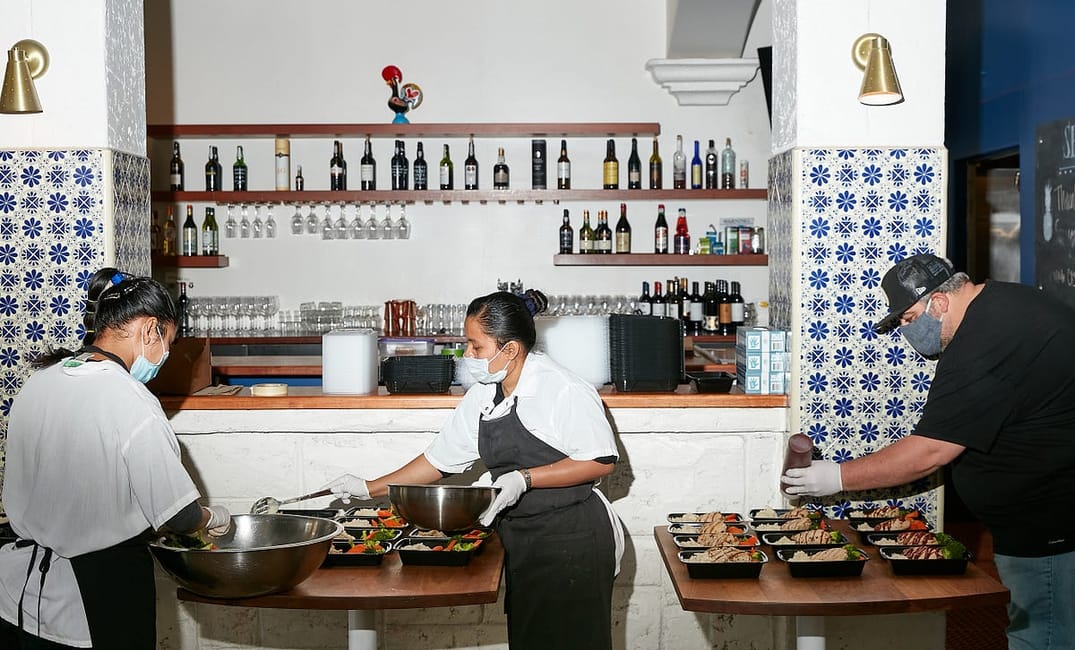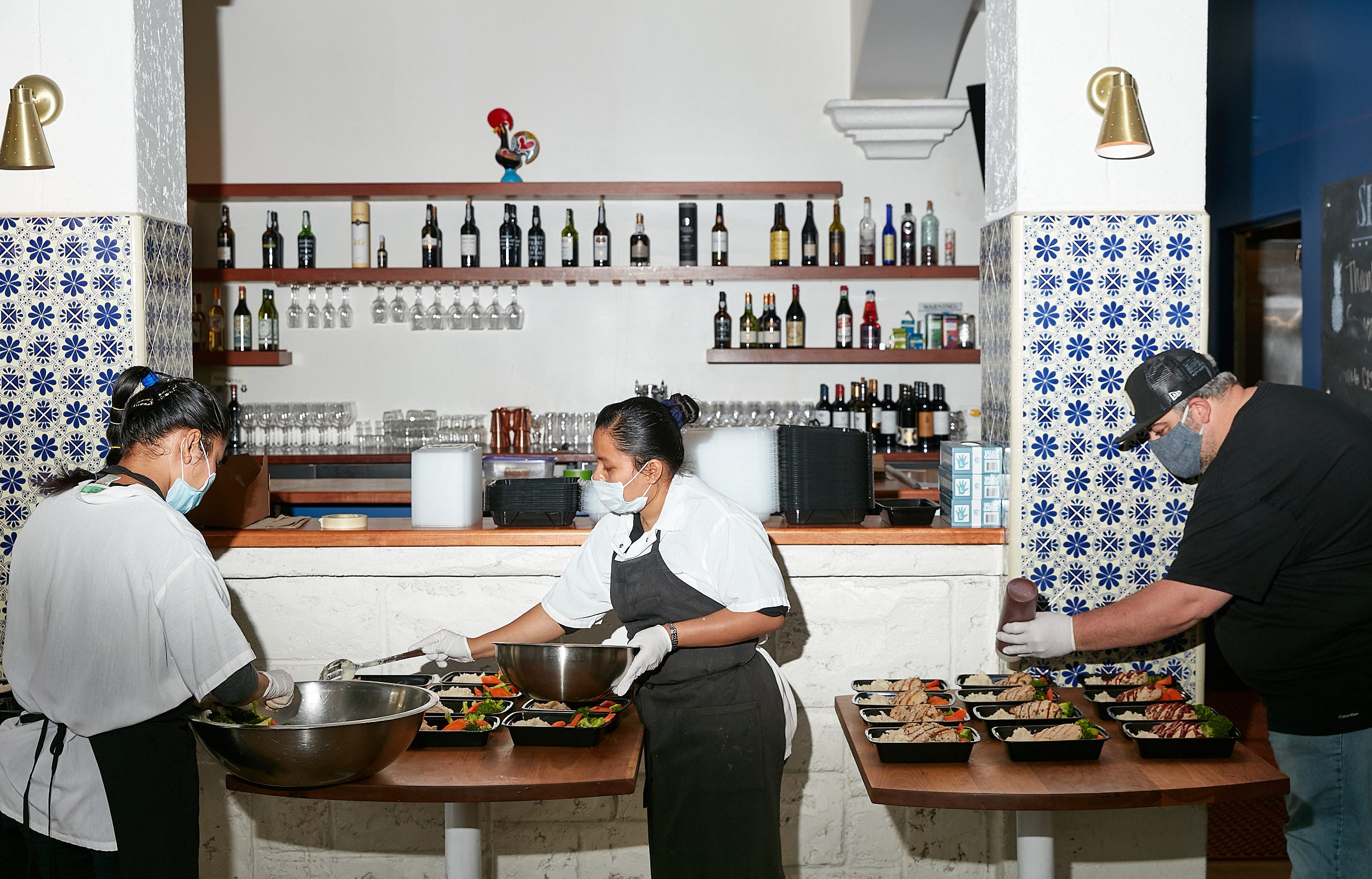
Nine years ago this month, my childhood best friend and I started Three Babes Bakeshop in San Francisco with $10,000 we raised on Kickstarter. It was nowhere near enough money to launch a business, but against all odds, we made it work.
We rented kitchen space from a catering company and baked pies in the off-hours (i.e., all night) in exchange for unbelievably low rent. On weekends, we set up a mini pie shop inside of a shipping container in the Mission District. Given our small margins, we struggled through with a ramshackle crew of volunteers and part-time staff. Over time, we built a real company with a solid team. It was hard work, but we felt a sense of pride. As of March 1, we had 26 team members and were weeks away from moving into our first brick-and-mortar space.
Sign up for The Bold Italic newsletter to get the best of the Bay Area in your inbox every week.
The first Friday in March, I went to a dinner party at a friend’s house. “This is it,” one guest said. “After this, we won’t see each other in person for a long time.”
“That’s a bit much,” I thought. But as it turns out, he was right. A few tech CEOs were at this party, and all of them said their companies (some of whom were my clients) would be working from home for the next few months. I immediately realized that 85% of our monthly revenue (regular catering for corporate clients) was about to evaporate, then spent the rest of the weekend ruminating over the reality that I would have to lay off most of my staff.
Tech companies get a lot of grief for not doing enough to help the local community, but they have been a boon to restaurants and many other small businesses.
Pies are extremely seasonal, but over the years, we built more stability into our business model by developing a breakfast pastry and dessert program for corporate dining rooms in San Francisco. Tech companies get a lot of grief for not doing enough to help the local community, but they have been a boon to restaurants and many other small businesses.
Before shelter-in-place orders, tech companies were the bread and butter of many small food businesses, including mine. It’s been an open secret for years that private dining rooms at all of SF’s favorite restaurants—rented every day for lunch and dinner by tech companies hosting corporate events—were keeping many businesses afloat. For us, the predictable revenue provided by large, daily deliveries to tech companies allowed us to create new jobs, give growth opportunities to our employees, and provide medical benefits. These accounts gave us financial stability, which balanced the volatility of retail sales and afforded us the ability to plan for expansion. It was an extremely stable channel. Until it wasn’t.
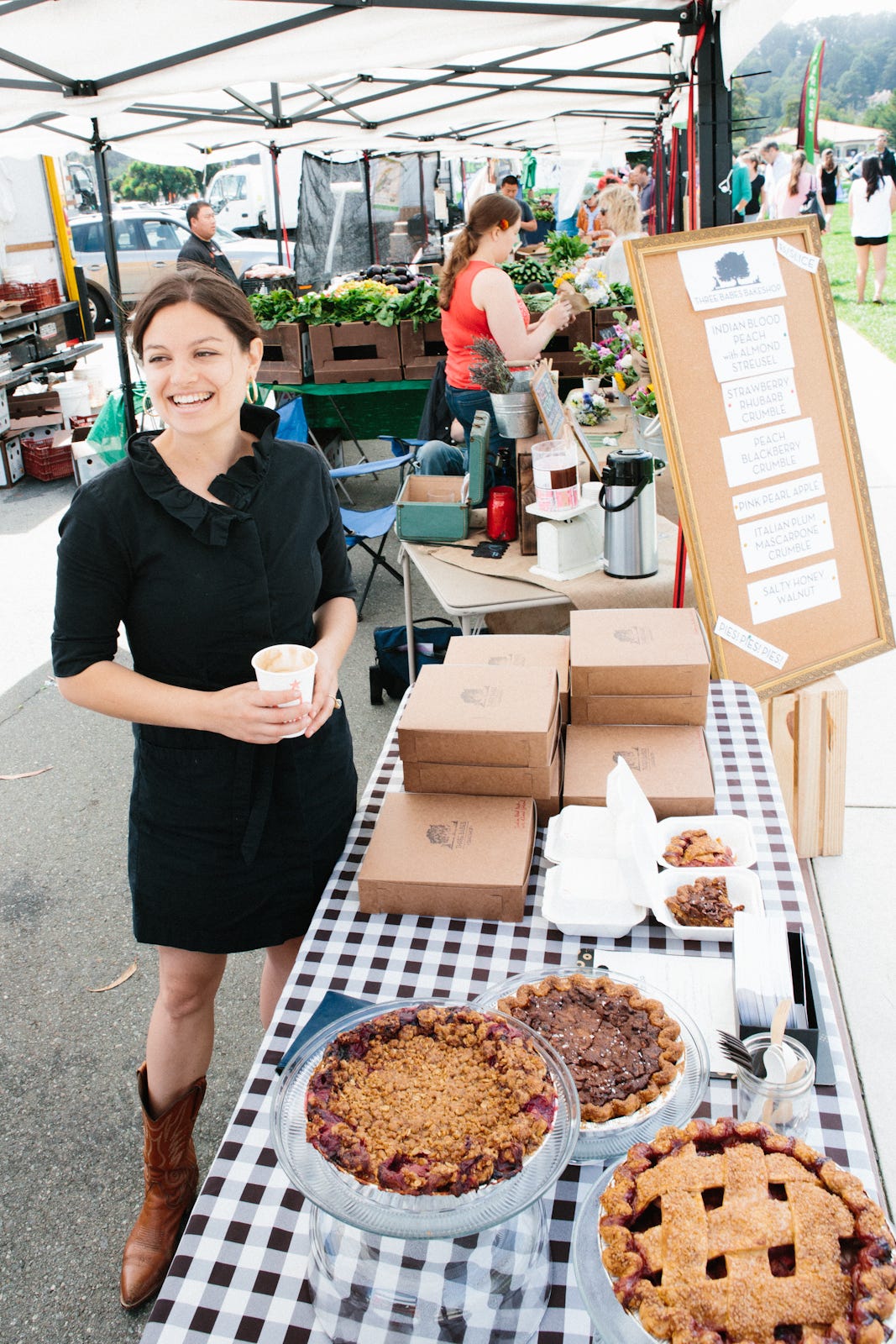
The Monday after my friend’s dinner, I laid off 20 of my 26 staff members. The remaining team spent the week helping former staff apply for benefits. I feared for the physical safety of our staff — some were losing health care, and a few were undocumented and unable to apply for any government assistance. I cried at work most days that week. Meanwhile, cancellations from customers poured in. Every one of our wholesale clients called to say they’d be closing indefinitely.
One week later, the shelter-in-place order was announced. I agonized over whether I should wait to run termination paperwork for my staff. The city had announced a program to pay for 40 hours of additional sick pay for each employee, but two weeks after the announcement, the application still hadn’t been released. We didn’t have the cash on hand to cover an extra payroll in the interim and ended up going with the layoffs before support became available weeks later. Some of my employees didn’t receive their first unemployment check for five weeks after their applications. It was clear that government relief was months away.
The same week the shelter-in-place order was enacted, my friend Emmett Shear reached out to ask if I would be interested in partnering to figure out a way to provide immediate support to small businesses during the Covid-19 crisis. Emmett and I met in college and share an interest in civic issues — he is the co-founder and CEO of Twitch, an online streaming company now owned by Amazon. Emmett said he’d commit $1 million if I was willing to make it happen.
My peers in the restaurant industry were about to go through the same painful process that I had, and this was an opportunity to bring the entire community together to take action.
I handed over leadership of my own company to my director of operations and proceeded, along with my friend and former employee Jacob Bindman, to commit myself full time to launching a new nonprofit. On March 23, SF New Deal was born.
The concept was simple: Put restaurants, and their employees, to work by paying them to make and deliver meals to people in need of food. Our biggest priority was getting money to small businesses as quickly as possible. I’ve learned from years of community work that it’s much easier to help someone who is right on the borderline — barely making it or just starting to slip behind — than it is to help someone regain their footing after they’ve already lost their business, their home, or their health.
Within days, we assembled a small team of volunteers, established a nonprofit, and began serving meals. Spiky demand makes it impossible to reliably employ staff, so we wanted to give restaurants a predictable volume at a reasonable price point. We built our model around paying restaurants $10 a meal. Restaurants average $8,000 per week, or $32,000 per month, in orders through our program. The money we supply is meant to supplement existing revenue from takeout and delivery programs to help food businesses stay open, keep staff on payroll, and, in some cases, hire back laid-off team members.
Our first week in operation, we worked with three restaurants and delivered 1,000 meals. Within one week, we’d scaled to 18,000 meals delivered. We’ve delivered more than 150,000 meals to over 70 sites around San Francisco and will have disbursed $1.7 million to small businesses in the city. We are committed to supporting our partners through the end of May, in line with current shelter-in-place guidance.

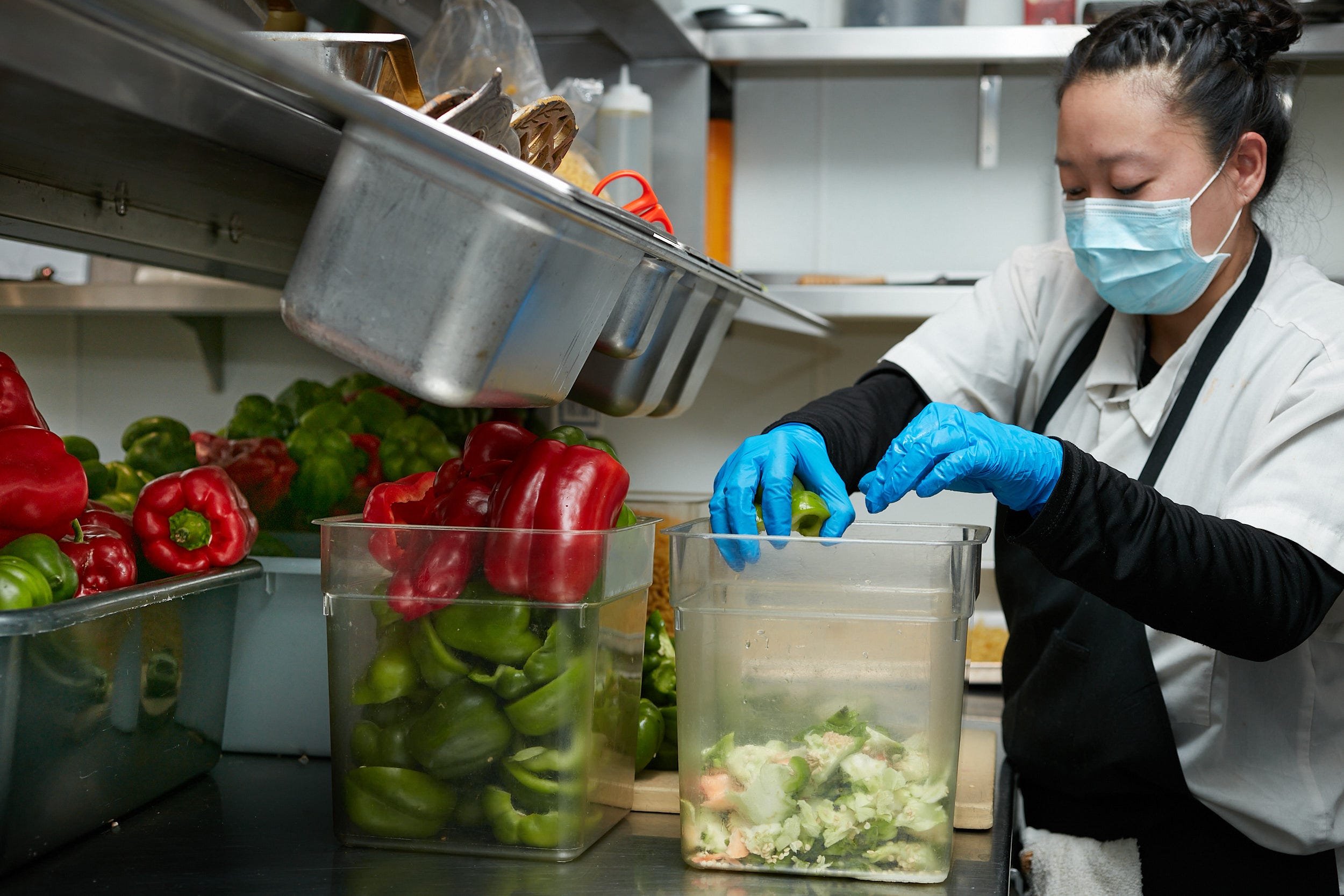
For us, the key to scaling quickly has been working with community partners such as the African American Faith-Based Coalition, UCSF’s Division of Citywide Case Management, the City of SF’s Human Rights Commission, the Asian Pacific Fund Community Foundation, and the Chinatown Community Development Center. These groups have been serving their respective constituents for years, providing resources to people who have often been underserved and ignored. We are now partnering with over 18 community-based organizations that deeply understand the diverse needs of our city’s residents. Through these community partners, we are serving intergenerational families, kids who have just been released from detention centers, people who are HIV positive, elders with a range of preexisting conditions, and people living with mental illness in SROs and hotels. For these groups, food insecurity is not new, but it has grown considerably in the past few months.
I’ve been awed by the speed and urgency with which our community has united in response to the pandemic. Donors large and small, dozens of volunteers, corporate partners who have contributed resources (self-driving cars, legal and financial services, money to pay for meals), and community partners from across the city have come together to address the challenges that face us. Seeing this collective action has given me hope that when this is over, we may be able to solve more of the seemingly intractable problems that have dogged our city for ages. Homelessness, housing, hunger — these are complex problems, but a crucial first step is simply harnessing our own political will across sectors. We have to believe that as citizens and a society, we are capable of and deserve more than the present circumstances in which we find ourselves.
We can’t wait for the government. The more than 150,000 meals we’ve provided since our launch have been funded almost entirely with private money. The city government has been exclusively focused on feeding Covid-19-positive people until now. One notable exception is the City of SF’s Human Rights Commission, whose chief of staff, Brittni Chicuata, has advocated tirelessly for feeding high-risk populations. She managed to get funding for tens of thousands of meals, which we delivered to public housing sites around the city.
FEMA and state funding, which have already been announced, will not be available for weeks. The government must engage in a fair and transparent process to select recipients, which takes time. All the while, hungry people are going hungry.
Many of the people we serve have no other access to food — the single meal we provide them is all they have to eat each day. Everyone we have interacted with at the city has been hard-working and well-intentioned, but there are clear constraints on management capacity. While government aid may arrive eventually, who can wait months for support? Certainly none of my employees, none of the hungry families we are serving, and very few small-business owners.
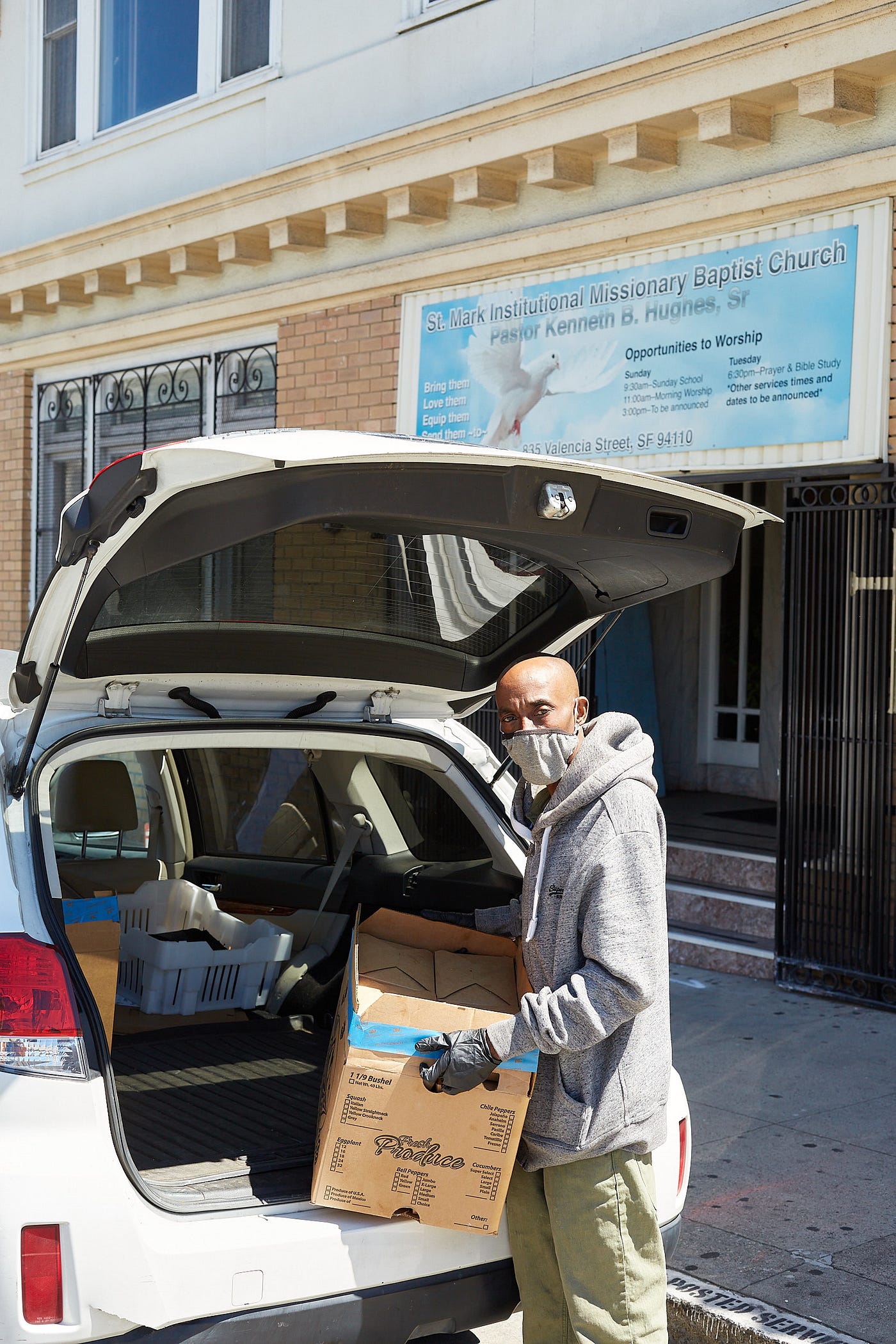
We need to raise money to help our neighbors in need stay healthy and safe. Their well-being affects us all. As an all-volunteer staff, we have almost zero overhead and have been able to efficiently support restaurants while simultaneously feeding many thousands of people each week. Still, the need from both restaurants and meal recipients is staggering. We’re serving nearly 20,000 meals a week right now but have demand for upward of 11,000 more. We have more than 100 restaurants on our wait list. Join us in helping to feed our neighbors and keep our small businesses from closing for good. If you can, please consider donating. Anything helps. If you can’t give, follow us on Twitter and Instagram at @SFNewDeal, volunteer with us, or write to us to learn more about setting up an employer match through your workplace. Meanwhile, support our local businesses, shop at your local farmers market, and mostly, keep being nice to each other. It’s up to all of us to create the community we want to live in.



